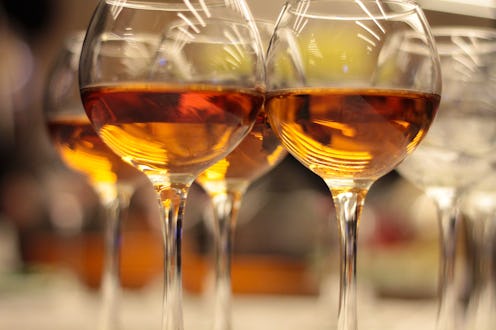When it comes to the world of adult beverages, it seems like every season there's a trendy new something to sip on — whether it be a cocktail spiked with buzzy wellness ingredients or the latest wine craze. And in terms of the latter of these, not long ago everyone was obsessing over which pink wine they wanted to spend their summer drinking. Now there's a new hue that wine connoisseurs are stocking up on, and it's one you might not have guessed. So exactly what is orange wine and why is it something you might want to try? One expert is spilling the details of this drink-du-jour.
As a sommelier, author of Drink Pink: A Celebration of Rosé, and beverage director at NYC eatery Cote, Victoria James is a bonafide pro when it comes is wine. And while she'll always have a special place for rosé in her heart, she's also acknowledging that at the moment orange just might be the new pink. But don't let the name confuse you: Orange wine is more of a style than anything, and as James explains, it has to do with how it's made. "[Orange wine is] simply when white grape juice spends time on its skins," she says. "Usually, white grapes are pressed almost right away. However, with orange wine the juice is left in contact with the skins and therefore picks up a bit of color, tannin (that drying sensation in your mouth), and structure."
Because of this process, orange wines are also natural, as in they're unfiltered and unfined, and have minimal to no additives. And regardless of the fact that they're certainly having a moment of late, this style of wine is actually pretty old fashioned and has enjoyed popularity in other parts of the world for a while now. "[Orange wine] has a big cult following in Northeastern Italy, the Friuli-Venezia-Giulia area and neighboring Slovenia," James says. "Of course, I have had orange wines from all over the world as well, but I think this is where some of the big names in this movement come from — including Radikon, Gravner, and Zidarich."
As for why people in the United States are suddenly raving about orange wines more than ever, James attributes that to the accessibility and curiosity Americans have toward wine in general. That said, this drink is definitely one to recommend to a more adventurous wine drinker. "These wines are not like white nor like red, they're completely their own thing," James says. And like most natural wines, their flavor can be a bit more unique than a traditional white wine and you might find them to be more hearty and complex, due to the process by which they're made.
So if you're game to try something new, orange wines just might be your new spring drink. And if you're looking to pair it with some tasty dishes at your next dinner party, take James' advice and go with this no-fail formula: "The best equation for me is meat (pork products especially), fermented flavors, dried fruits, and starches like potatoes, polenta, even beans!"
Another great thing about orange wines is that just because this style is super popular, you don't have to spend a ton of cash on a decent bottle. In fact, there are tons of winemakers creating affordable ones. Ahead, find a few orange wines to intro you to the trend in a range of prices and palettes, based on where it's made.
